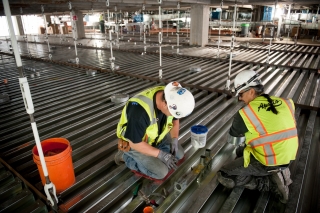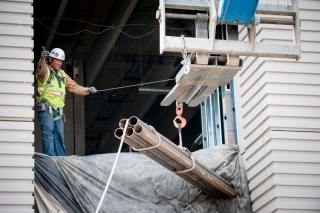|
Subscribe / Renew |
|
|
Contact Us |
|
| ► Subscribe to our Free Weekly Newsletter | |
| home | Welcome, sign in or click here to subscribe. | login |
Construction
| |

August 7, 2014
Apollo logs 5 million hours without an accident
Journal Staff Reporter
An employee of Kennewick-based Apollo Mechanical stepped through a hole in a roof in November of 2000 and fell 24 feet while working on a project in Portland.
That incident changed how the approximately 1,000-person firm approaches safety, company executives said.
“We take safety as a value now,” said Apollo President Bob Hightower. “It's not something that we take lightly. It's a value that we preach every day.”
The mechanical contractor is celebrating more than 5 million worker hours without a lost-time accident — an injury a doctor deems significant enough to keep an employee from working — said Mike Ellis, corporate safety manager. The company's last lost-time incident was in February of 2011.
The national average is about one lost-time accident for every 200,000 worker hours, he said.
The firm was founded in 1981 as Apollo Sheet Metal. Ellis said the 2000 accident, in which the worker survived, occurred when it was much smaller.
“It kind of shook the company,” Ellis said. “They hired me shortly thereafter.”
Safety precautions are essential in the work Apollo does. It primarily installs heating, air-conditioning, plumbing and piping in building projects, and manufactures some materials involved in those systems, such as ductwork.
Most Apollo workers do “inherently dangerous” jobs up high and around heavy equipment, Ellis said.
“They're almost continuously working in elevations where a simple fall can kill you,” he said. “(And) there just are a lot of big, heavy things that can fall over on you or hurt your back.”
Ellis has been a construction safety professional for 24 years. When he started with Apollo in 2000, the company didn't have a written safety program, a claims management program to help take care of injured workers, drug testing, jobsite safety inspections, and accountability to ensure not only workers but supervisors were following safety rules, he said. It also had only limited safety training.
If a worker was injured, “we really didn't take care of them when we should,” he said.
Now Apollo has those safety programs. Ellis said it also provides robust safety training for employees and the project management team, and buys needed safety equipment — from fall protection systems to cut-resistant gloves. It also holds monthly meetings for supervisors to go over safety challenges and jobsite inspections.
It took a number of years for that shift to occur, Ellis said, but now, no matter the cost or implications for the schedule, Apollo puts worker safety first.
“We try our best to protect our number one asset, and it's the simplest, the right thing to do,” he said.
It attracts better workers, he said.
“No one wants to go to work fearful of injury, and I think our reputation is we take care of our employees,” he said.
Apollo didn't pump up its safety program to lessen its exposure to liability, Ellis said, but one by-product is having “very little third party liability lawsuits.”
Recently, the Mechanical Contractors Association of America recognized Apollo with a Safety Excellence award for its performance in 2013. Michael R. Cables, president of MCAA at the time, said Apollo's senior management stresses safety from the top down.
“They put their money where their mouth is,” he said. “It's a huge deal. Five million man hours is a lot of man hours for there to be no lost-time incident.”
Safety is good business, Cables said.
“General contractors, construction managers and owners take safety very seriously to the point that if you don't have a good safety record oftentimes they won't let you bid their project,” he said.
Hightower said Apollo's record allows it to work on big public and private projects where a good safety rating is required.
“It's a requirement on a lot of RFPs that we put in,” he said. “To get short-listed your safety rating has to be good or you're not even allowed to participate.”
The record also means Apollo pays less for industrial insurance, he said.
Hightower said every morning workers at Apollo Mechanical do stretch and flex exercises. These are designed to help reduce strains and sprains on jobsites, but even the office staff does them.
“We're part of the team,” he said.
Lynn Porter can be
reached by email or by phone
at (206) 622-8272.
Previous columns:
- Women-owned firms seeking WSDOT jobs say they'll fight to keep DBE status, 07-31-2014
- Alaska starts work on $11M project that will connect one bush village to roads — almost, 07-24-2014
- $7M rehab of Seattle Tennis Club wasn't a big job, but it sure was complicated, 07-17-2014
- Dan Peyovich has risen rapidly at HSW by embracing technology and teamwork, 07-10-2014
- Oregon couple builds a new kind of farm that uses fish to help grow vegetables, 07-03-2014
- Veterans find camaraderie in carpentry, 06-26-2014
- New company puts reclaimed wood on the table, 06-19-2014
- Starting July 1, Seattle construction and demolition projects will need waste diversion plans, 06-12-2014




